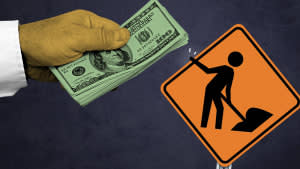Democrats can solve all their infrastructure problems with 1 easy trick

Democrats' push for new spending on infrastructure and welfare has gotten bogged down. The major problem within the caucus, it seems, is not the contents of President Biden's proposals but the tax increases on the wealthy he would use to pay for them. Lobbyists are crawling over Capitol Hill like maggots on a ripe horse carcass, and corrupt party members are getting more and more squirrelly about every proposed revenue raiser. Sens. Krysten Sinema (D-Ariz.) and Joe Manchin (D-W.V.) have attracted most of the criticism for refusing to reform the filibuster, but if the Senate vote against the $15 minimum is any guide, there are probably another dozen or so congressional Democrats that rate the pocketbooks of the donor class above their own party's political fortunes or the survival of the American republic.
However, it is worth remembering that there is a simple and easy way to cut this political knot — just borrow the money. Raise whatever taxes the corporate stooges can stomach, borrow the balance, and we can all get on with our lives.
For one thing, there is no sign that the nation is running out of room to borrow. Despite the large national debt, borrowing costs as a percentage of GDP are near historic lows — barely half of what they were in the 1990s. There have been some price hikes in some markets, but these appear to be mostly temporary supply bottlenecks related to the pandemic, and in some cases like lumber, prices seem to have already turned the corner. It'll sort itself out sooner or later, if demand remains strong.
Meanwhile, the most recent jobs report found only modest hiring in May — 559,000 new jobs, while America is still about 7.4 million jobs below where it was in February 2020. Economic data are noisy and it will take many more months to get a clear picture of what's happening, but for the moment it looks as though a full economic recovery may take well into 2023. It would be wise to give the economy another boost for the next few years, in case the sugar high of the pandemic rescue packages runs out next year.
Republicans have been using the deficit as a political solvent for the last 40 years, and there have been no serious macroeconomic consequences whatsoever. Indeed, by far the worst problem with the deficit over this period was that it was far too small in the decade after 2009. Obama's Recovery Act stimulus was less than half as big as it needed to be, which created a lost decade of lousy growth that helped elect Donald Trump. It would have been far wiser and more responsible for Democrats to have their cake (spending) and eat it too (no taxes to pay for it).
This is especially true with respect to infrastructure spending. As economic historian Adam Tooze points out, repairing roads and bridges, expanding passenger rail, spending on green research, and so on, should pay for itself over the medium term with increased economic output and hence tax revenue. Businesses often borrow to invest for the same reason — one example where governing in a businesslike fashion actually makes good sense.
Of course, there is a big obstacle to carrying out this plan: the filibuster. According to the completely arbitrary Senate rules, a reconciliation bill that can be passed with just 51 votes can't raise the deficit for more than one year. That's part of why Biden packaged his proposal with taxes in the first place — so it could eventually sidestep the filibuster. But if Senate Democrats just axed the filibuster (which they could do at any time), all bills could be passed with 51 votes.
I doubt very much that the deciding Democratic senators will follow my advice. It looks increasingly plausible to me that the American Rescue Plan from March will be the last significant thing Democrats pass this term, after which extreme gerrymandering will allow Republicans to win a sweeping victory in 2022, and Democrats will not be able to pass another law for another decade-plus, if not forever. But it's worth emphasizing how easy it would be for the party to get out of the fix it is in. Just embrace "irresponsibility" and do the easy, simple thing.
Imagine you're a college student on spring break with a $10 trillion limit on the credit card, except the interest rate is 0.01 percent and instead of buying a ton of cocaine and rum, you're providing badly needed jobs, elder care, and more for your fellow citizens, plus action on climate change to help stave off a looming catastrophe. A political party behaving with the slightest scrap of rational self-interest would have done this months ago.
